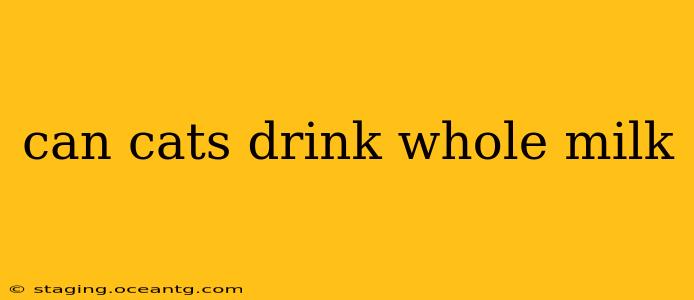Many cat owners wonder if their feline friends can enjoy a glass of milk alongside them. While the image of a cat lapping up a saucer of milk is a classic, the truth is more nuanced. The short answer is: no, cats shouldn't regularly drink whole milk. While some cats might tolerate a tiny lick, regular consumption can lead to several health problems. Let's delve deeper into why.
Why is Milk Bad for Cats?
Cats, unlike humans, are lactose intolerant. This means their bodies lack the enzyme lactase, which is necessary to digest lactose, the sugar found in milk. When a cat drinks milk, the undigested lactose ferments in their intestines, leading to several unpleasant and potentially harmful consequences.
What Happens When Cats Drink Milk?
The most common symptoms of lactose intolerance in cats include:
- Diarrhea: This is often the first and most noticeable symptom. The undigested lactose draws water into the intestines, resulting in loose, watery stools.
- Vomiting: The body's attempt to expel the irritant can lead to vomiting.
- Gas and Bloating: Fermentation in the intestines produces gas, leading to discomfort and bloating.
- Stomach Pain: The inflammation caused by the lactose can cause significant abdominal pain.
- Dehydration: Severe diarrhea and vomiting can lead to dehydration, which is a serious medical condition requiring veterinary attention.
What Kind of Milk is Best for Cats (If Any)?
While whole milk is generally off-limits, some cat owners might consider alternatives like lactose-free milk. However, even lactose-free milk isn't ideal for a cat's diet. Milk isn't a necessary part of a cat's nutrition, and there are far better options available to provide them with hydration and essential nutrients.
What Should I Give My Cat to Drink Instead of Milk?
The best beverage for your cat is fresh, clean water. Cats need constant access to fresh water to stay hydrated. You can also consider offering:
- Water fountains: These can encourage cats to drink more.
- Broth (low-sodium): Small amounts of low-sodium chicken or beef broth can be offered occasionally. Avoid broth with added seasonings or onions.
Can Kittens Drink Milk?
Even kittens, despite their younger age, are still lactose intolerant. While a mother cat's milk is designed for her kittens, cow's milk is not a suitable substitute. If a kitten is orphaned or unable to nurse, specialized kitten formula should be used under veterinary guidance.
My Cat Loves Milk, What Should I Do?
If your cat shows a strong preference for milk, it's crucial to wean them off. Gradually reduce the amount of milk you offer, replacing it with fresh water. Positive reinforcement with treats can help redirect their attention. If your cat shows persistent digestive issues after drinking milk, consult your veterinarian.
Is There Any Benefit to Cats Drinking Milk?
No, there's no nutritional benefit for cats to drink milk. A balanced diet of cat food provides all the essential nutrients they need.
Can Cats Be Allergic to Milk?
While lactose intolerance is common, some cats might also have a true milk allergy, a more severe reaction to milk proteins. Symptoms of a milk allergy can range from mild gastrointestinal upset to more serious reactions like hives or respiratory distress.
Remember, always prioritize your cat's health and well-being. While a small amount of milk might not cause immediate harm, regular consumption is detrimental to their health. Fresh water should always be the primary drink for your feline companion.
